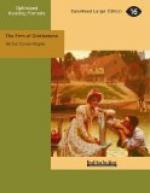“Can’t you see him yet?” the doctor asked for the twentieth time.
“No, dear, I don’t,” she answered, glancing up and down the street.
“He must be out now. He should have come straight to us. Come away from the window, my dear. We must not let the young monkey see how anxious we are about him.”
Kate sat down by the old man and stroked his broad brown hand with her tender white one. “Don’t be uneasy, dear,” she said; “it’s sure to be all right.”
“Yes, he is sure to pass,” the doctor answered; “but—bless my soul, who’s this?”
The individual who caused this exclamation was a very broad-faced and rosy-cheeked little girl, coarsely clad, with a pile of books and a slate under her arm, who had suddenly entered the apartment.
“Please sir,” said this apparition, with a bob, “I’m Sarah Jane.”
“Are you, indeed?” said the doctor, with mild irony. “And what d’ye want here, Sarah Jane?”
“Please, sir, my mithar, Mrs. McTavish, asked me if I wudna’ gie ye this letter frae the gentleman what’s lodgin’ wi’ her.” With these words the little mite delivered her missive and, having given another bob, departed upon her ways.
“Why,” the doctor cried in astonishment, “it’s directed to me and in Tom’s writing. What can be the meaning of this?”
“Oh dear! oh dear!” Mrs. Dimsdale cried, with the quick perception of womanhood; “it means that he has failed.”
“Impossible!” said the doctor, fumbling with nervous fingers at the envelope. “By Jove, though,” he continued, as he glanced over the contents, “you’re right. He has. Poor lad! he’s more cut up about it than we can be, so we must not blame him.”
The good physician read the letter over several times before he finally put it away in his note-book, and he did so with a thoughtful face which showed that it was of importance. As it has an influence upon the future course of our story we cannot end the chapter better than by exercising our literary privilege, and peeping over the doctor’s shoulder before he has folded it up. This is the epistle in extenso:—
“My Dear Father,
“You will be sorry to hear that I have failed in my exam. I am very cut up about it, because I fear that it will cause you grief and disappointment, and you deserve neither the one nor the other at my hands.”
“It is not an unmixed misfortune to me, because it helps me to make a request which I have long had in my mind. I wish you to allow me to give up the study of medicine and to go in for commerce. You have never made a secret of our money affairs to me, and I know that if I took my degree there would never be any necessity for me to practise. I should therefore have spent five years of my life in acquiring knowledge which would not be of any immediate use to me. I have no personal inclination towards medicine, while I have a very strong objection




